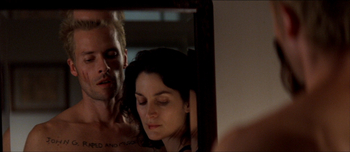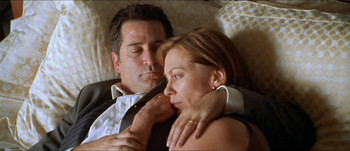 Much to my surprise, I can find no reference to the nearly universal cinematic “wedding-ring rule”: Any time a wedding ring is a prominent prop or visual motif in a movie, infidelity will be a central theme. The obverse: Any movie with infidelity as a central theme will feature the wedding ring as a prop or visual motif. I could offer dozens of examples, but the best might be Lantana, which is obviously about sexual straying but has a greater interest in marriage overall, especially the underlying, intertwined issues of trust and honesty. Although it’s nearly too blunt in its themes, the movie feels continuously right, nailing not only relationship dynamics but interred grief and pain. Throughout, it gets the tone, nuance, and scale of life correct.
Much to my surprise, I can find no reference to the nearly universal cinematic “wedding-ring rule”: Any time a wedding ring is a prominent prop or visual motif in a movie, infidelity will be a central theme. The obverse: Any movie with infidelity as a central theme will feature the wedding ring as a prop or visual motif. I could offer dozens of examples, but the best might be Lantana, which is obviously about sexual straying but has a greater interest in marriage overall, especially the underlying, intertwined issues of trust and honesty. Although it’s nearly too blunt in its themes, the movie feels continuously right, nailing not only relationship dynamics but interred grief and pain. Throughout, it gets the tone, nuance, and scale of life correct.
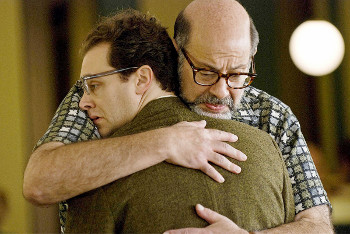 I was surprised after watching (and then reading reviews of) the Coen brothers’ A Serious Man that there was such a fervent (if small) backlash against it. The movie – about a Job-like Jewish professor in a Minnesota suburb in the late 1960s – struck me as so right that I didn’t allow for opposite reactions. Yet there they are.
I was surprised after watching (and then reading reviews of) the Coen brothers’ A Serious Man that there was such a fervent (if small) backlash against it. The movie – about a Job-like Jewish professor in a Minnesota suburb in the late 1960s – struck me as so right that I didn’t allow for opposite reactions. Yet there they are.
 When I say that the filmed version of Watchmen and the horror remake Quarantine are faithful to the point of tedium, I intend that largely as a compliment. Great talent, care, time, and money have been spent not fixing what ain’t broke. Considered separate from their sources, both movies work. But they’re damned depressing.
When I say that the filmed version of Watchmen and the horror remake Quarantine are faithful to the point of tedium, I intend that largely as a compliment. Great talent, care, time, and money have been spent not fixing what ain’t broke. Considered separate from their sources, both movies work. But they’re damned depressing. Lars von Trier’s Antichrist in 560 characters over four Tweets: descriptive, positive, a turning point, and ultimately (in both the “finally” and “fundamentally” senses of the word) negative.
Lars von Trier’s Antichrist in 560 characters over four Tweets: descriptive, positive, a turning point, and ultimately (in both the “finally” and “fundamentally” senses of the word) negative.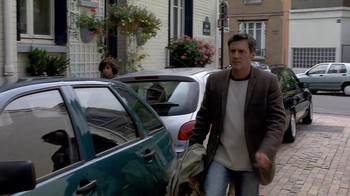 In his
In his  A throw-away bit of connective tissue struck me in
A throw-away bit of connective tissue struck me in 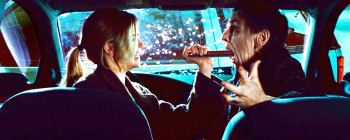 Sam Raimi’s Drag Me to Hell exists mostly to remind the world that Sam Raimi made The Evil Dead and can still make The Evil Dead, which is good to know because Sam Raimi is
Sam Raimi’s Drag Me to Hell exists mostly to remind the world that Sam Raimi made The Evil Dead and can still make The Evil Dead, which is good to know because Sam Raimi is  While I still don’t really understand the Twitter phenomenon, I’ve loved using the 140-character limit for extreme forced concision. The aim is always to pack these ridiculously short reviews with enough meaning that I don’t feel guilty about never writing more about a particular movie or television show. I would never say that 140 characters is sufficient to discuss much of anything – let alone a feature film – but it’s a great if arbitrary writing exercise: How much can you say within Twitter’s confines? For the most part, I’ve been happy with the results. But with Tell No One, I feel that I need to explain myself.
While I still don’t really understand the Twitter phenomenon, I’ve loved using the 140-character limit for extreme forced concision. The aim is always to pack these ridiculously short reviews with enough meaning that I don’t feel guilty about never writing more about a particular movie or television show. I would never say that 140 characters is sufficient to discuss much of anything – let alone a feature film – but it’s a great if arbitrary writing exercise: How much can you say within Twitter’s confines? For the most part, I’ve been happy with the results. But with Tell No One, I feel that I need to explain myself. It is a car salesman that carries writer/director Kirt Gunn’s Lovely by Surprise on his shoulders until the movie blossoms. To his credit, Bob doesn’t actually sell cars. In the automobile-sales process, he dispenses hackneyed life advice, admonishing his customers that they need to spend more time with their families, and do they really want to part with that old clunker, filled as it is with memories? He is played with sincerity by Reg Rogers, in the sense that Bob means everything he says. But there’s a fakeness, a performance, about Bob – a smiling, cheery devil-may-care mask that makes him both inscrutable and intensely compelling. A
It is a car salesman that carries writer/director Kirt Gunn’s Lovely by Surprise on his shoulders until the movie blossoms. To his credit, Bob doesn’t actually sell cars. In the automobile-sales process, he dispenses hackneyed life advice, admonishing his customers that they need to spend more time with their families, and do they really want to part with that old clunker, filled as it is with memories? He is played with sincerity by Reg Rogers, in the sense that Bob means everything he says. But there’s a fakeness, a performance, about Bob – a smiling, cheery devil-may-care mask that makes him both inscrutable and intensely compelling. A 
